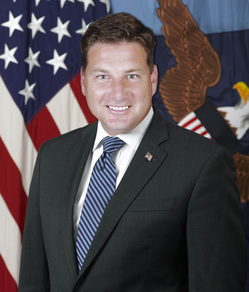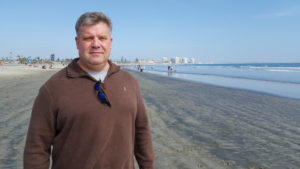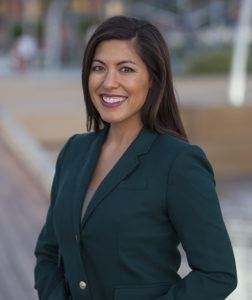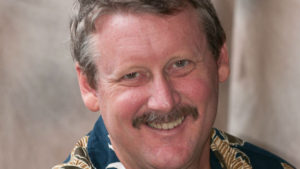
On Tuesday, April 19, the Coronado Republican Women, Federated invited the contenders for the U.S. House of Representatives in our District, District 52, to the Coronado Library Winn Room to debate the issues. All the Republican Congressional candidates (listed alphabetically) welcomed the opportunity: Terry Allvord, Jacquie Atkinson, Mike Canada, Denise Gitsham, and John Horst.
After Lynn Reagan, President of the San Diego County Federation of Republican Women, lead the assembled in the Pledge of Allegiance, she opened the event with these words: “Don’t despair.” This statement was in context of the current presidential election.
She encouraged the audience by telling an amusing historical anecdote of the contentious nomination process that occurred in a 1920s Republican Convention, which culminated in the the final nomination of Warren G. Harding. Although Ohio Governor Warren G. Harding had been the front runner, it took ten ballots over the course of two days for Harding to finally secure the Republican nomination.
Councilmember Richard Bailey, who is currently running against Councilmember Carrie Downey for Mayor of Coronado, moderated the well-organized debate that saw approximately 40 people in attendance.
The candidates are vying with Democrat Scott Peters to be one of the top-two candidates in the June 7 primary. According to California’s primary procedure, the top two candidates, regardless of party affiliation, will advance to the November election. As Scott Peters is the incumbent, he is expected to occupy one of those spots in the November election. That leaves the field open to the Republican candidates to fill the second slot.
Mr. Bailey invited to candidates to make an opening statement.
In their opening statements, all of the candidates detailed their strong connections to the military. Mr. Allvord, Ms. Atkinson, and Mr. Canada are military veterans, and Ms. Gitsham and Mr. Horst had fathers who served over twenty years in the U.S. military.
All the candidates are small business owners.
Highlighting an understanding of the complexity of immigration issues in her opening statement, Ms. Gitsham shared her experience of being the daughter of an immigrant, and both Mr. Horst and Mr. Canada shared their experiences being married to immigrants.
Mr. Bailey then presented the candidates with two types of questions. One type of question was a general question in which the candidates had a few minutes to respond. After all candidates had an opportunity to respond, follow-up comments by the candidates were permitted.

Following the theme of immigration, the first question Mr. Bailey asked was what would be the candidate’s solution to immigration. All were in agreement that the borders need to be secured, but varied in their approach as to how this would occur. Ms. Atkinson called for more support for border patrol, walls, and improved technology, Mr. Horst called for a clean-up of immigration bureaucracy, and Mr. Canada outlined a path to citizenship, calling for a practical solution to the 11 million undocumented people in the U.S. Asked by Mr. Bailey, all candidates supported de-funding sanctuary cities. There were mixed responses to limiting H-1B Visas.

All candidates identified themselves as fiscal conservatives, all called for IRS reform, and many supported a flat tax rate.
All supported an increase in military spending. All supported school vouchers for education.

A second type of question posed by Mr. Bailey was “rapid response.” Mr. Bailey asked the candidates a question, but they had to remain verbally silent and simply lift one of two cards: either the card that read “yes” or a card that read “no.” After the cards were lifted, Mr. Bailey asked candidates, especially those who voted outside of the majority, for a clarification of their response.

Sample questions posed for rapid response included: “Would you appeal ObamaCare?” All candidates voted yes, with some clarification. Ms. Atkinson stressed her belief that ObamaCare (the Affordable Care Act) while flawed, cannot be yanked-out from under the many citizens who now have health care. She did, however, stress that ObamaCare should be revised and reformed.

When the candidates were asked if marriage should be federally defined as being only between a man and a woman, all candidates, except Ms. Atkinson voted yes. Ms. Atkinson believes that this is a state issue, not a federal issue. She also stressed that she would 100% represent the will of her district, should she be elected.
After the debate, various members of the audience expressed how helpful the debate had been. Long time resident, military spouse, and lifelong Republican, Adrianne McCullough shared her thoughts: “The event was so well organized; it was a beautiful format; there are five really good candidates.”
The California primary is June 7. To vote in the June primary you must be registered by May 23. You will have to vote in person. The deadline for mail-in ballots has passed. No matter what your political party, or even if you “decline to state,” you may vote in the June 7 Primary Election for U.S. Congress.
The vote for Coronado Mayor and City Council will not be until the November 8, 2016 ballot. The deadline to register to vote in this November election is October 23, 2016.
Here is the link to register to vote online.
In the Presidential Primary, remember that if you “decline to state” a political party, you can only vote in the Democratic Party Primary. If you want to vote in the Republican Primary, you must to register as a Republican. These rules were created by the parties themselves.




